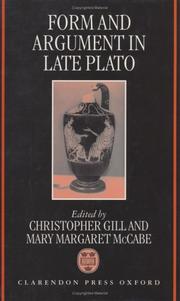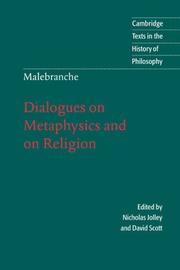| Listing 1 - 10 of 25 | << page >> |
Sort by
|
Book
ISBN: 1628941340 9781628941340 9781628941326 9781628941333 Year: 2015 Publisher: New York
Abstract | Keywords | Export | Availability | Bookmark
 Loading...
Loading...Choose an application
- Reference Manager
- EndNote
- RefWorks (Direct export to RefWorks)
Life. --- Conduct of life. --- Imaginary conversations. --- Conversation, Imaginal --- Conversation, Imaginary --- Dialogues, Imaginal --- Imaginal dialogues --- Conversation --- Dialogues --- Ethics, Practical --- Morals --- Personal conduct --- Ethics --- Philosophical counseling --- Life --- Philosophy
Book
ISBN: 9789045704210 Year: 2010 Publisher: Antwerpen Amsterdam Augustus
Abstract | Keywords | Export | Availability | Bookmark
 Loading...
Loading...Choose an application
- Reference Manager
- EndNote
- RefWorks (Direct export to RefWorks)
Stilistics --- Conversation [Imaginal ] --- Conversation [Imaginary ] --- Conversations [Imaginal ] --- Conversations [Imaginary ] --- Conversations imaginaires --- Dialogues [Imaginal ] --- Dialogues imaginaires --- Fictieve gesprekken --- Imaginal conversation --- Imaginal conversations --- Imaginal dialogues --- Imaginary conversation --- Imaginary conversations --- schrijven --- dialogen --- scenario's
Book
ISBN: 9029072385 Year: 2003 Publisher: Amsterdam : Meulenhoff,
Abstract | Keywords | Export | Availability | Bookmark
 Loading...
Loading...Choose an application
- Reference Manager
- EndNote
- RefWorks (Direct export to RefWorks)
Dutch literature --- Deadly sins --- Imaginary conversations --- Conversation, Imaginal --- Conversation, Imaginary --- Dialogues, Imaginal --- Imaginal dialogues --- Conversation --- Dialogues --- Capital sins --- Seven capital sins --- Seven deadly sins --- Sins, Capital --- Sins, Deadly --- Sins --- Sin, Mortal
Book
ISBN: 0881630454 Year: 1986 Publisher: Hillsdale, N.J. : Analytic Press,
Abstract | Keywords | Export | Availability | Bookmark
 Loading...
Loading...Choose an application
- Reference Manager
- EndNote
- RefWorks (Direct export to RefWorks)
Imaginary conversations --- Self-talk. --- Fantasy. --- Imagination. --- Psychological Theory. --- Psychological aspects. --- -Self-talk --- Communication, Intrapersonal --- Intrapersonal communication --- Talking to yourself --- Self-help techniques --- Conversation, Imaginal --- Conversation, Imaginary --- Dialogues, Imaginal --- Imaginal dialogues --- Conversation --- Dialogues --- Psychological aspects
Book
ISBN: 3030653870 3030653862 Year: 2021 Publisher: Cham, Switzerland : Springer,
Abstract | Keywords | Export | Availability | Bookmark
 Loading...
Loading...Choose an application
- Reference Manager
- EndNote
- RefWorks (Direct export to RefWorks)
How would Plato have responded if his student Aristotle had ever challenged his idea that our senses perceive nothing more than the shadows cast upon a wall by a true world of perfect ideals? What would Charles Darwin have said to Karl Marx about his claim that dialectical materialism is a scientific theory of evolution? How would Jean-Paul Sartre have reacted to Simone de Beauvoir’s claim that the Marquis de Sade was a philosopher worthy of serious attention? This light-hearted book proposes answers to such questions by imagining dialogues between thirty-three pairs of philosophical sages who were alive at the same time. Sometime famous sages get a much rougher handling than usual, as when Adam Smith beards Immanuel Kant in his Konigsberg den. Sometimes neglected or maligned sages get a chance to say what they really believed, as when Epicurus explains that he wasn’t epicurean. Sometimes the dialogues are about the origins of modern concepts, as when Blaise Pascal and Pierre de Fermat discuss their invention of probability, or when John Nash and John von Neumann discuss the creation of game theory. Even in these scientific cases, the intention is that the protagonists come across as fallible human beings like the rest of us, rather than the intellectual paragons of philosophical textbooks. .
Philosophy. --- Economic theory. --- Philosophy, general. --- Economic Theory/Quantitative Economics/Mathematical Methods. --- Economic theory --- Political economy --- Social sciences --- Economic man --- Mental philosophy --- Humanities --- Imaginary conversations. --- Philosophical recreations. --- Recreations, Philosophical --- Amusements --- Games --- Conversation, Imaginal --- Conversation, Imaginary --- Dialogues, Imaginal --- Imaginal dialogues --- Conversation --- Dialogues
Book
ISBN: 2878960467 9782878960464 Year: 1992 Publisher: Levallois-Perret: Manya,
Abstract | Keywords | Export | Availability | Bookmark
 Loading...
Loading...Choose an application
- Reference Manager
- EndNote
- RefWorks (Direct export to RefWorks)
Conversation [Imaginal ] --- Conversation [Imaginary ] --- Conversations [Imaginal ] --- Conversations [Imaginary ] --- Conversations imaginaires --- Dialogues [Imaginal ] --- Dialogues imaginaires --- Fictieve gesprekken --- Imaginal conversation --- Imaginal conversations --- Imaginal dialogues --- Imaginary conversation --- Imaginary conversations --- Communism --- Communisme --- History --- Imaginary conversations. --- Errors, inventions, etc. --- -Imaginary conversations --- Conversation, Imaginal --- Conversation, Imaginary --- Dialogues, Imaginal --- Conversation --- Dialogues --- Annals --- Auxiliary sciences of history --- Errors, inventions, etc --- Stalin, Joseph --- -Miscellanea --- Miscellanea --- History - Errors, inventions, etc. --- Rapports Est-Ouest --- Prose politique --- STALINE (Joseph Vissarionovitch Djougachvili, dit) --- Union Soviétique

ISBN: 0198240120 Year: 1996 Publisher: New York ; Oxford Clarendon Press
Abstract | Keywords | Export | Availability | Bookmark
 Loading...
Loading...Choose an application
- Reference Manager
- EndNote
- RefWorks (Direct export to RefWorks)
Conversation [Imaginal ] --- Conversation [Imaginary ] --- Conversations [Imaginal ] --- Conversations [Imaginary ] --- Conversations imaginaires --- Dialogues [Imaginal ] --- Dialogues imaginaires --- Fictieve gesprekken --- Imaginal conversation --- Imaginal conversations --- Imaginal dialogues --- Imaginary conversation --- Imaginary conversations --- Conversation, Imaginal --- Conversation, Imaginary --- Dialogues, Imaginal --- Conversation --- Dialogues --- Plato. --- Aflāṭūn --- Aplaton --- Bolatu --- Platon, --- Platonas --- Platone --- Po-la-tʻu --- Pʻŭllatʻo --- Pʻŭllatʻon --- Pʻuratʻon --- Πλάτων --- אפלטון --- פלאטא --- פלאטאן --- פלאטו --- أفلاطون --- 柏拉圖 --- 플라톤 --- Plato --- Platon --- Platoon --- Платон --- プラトン
Book
ISBN: 9789086791088 Year: 2008 Publisher: Roeselare,
Abstract | Keywords | Export | Availability | Bookmark
 Loading...
Loading...Choose an application
- Reference Manager
- EndNote
- RefWorks (Direct export to RefWorks)
Dutch literature --- 200 Politiek --- Allegiance --- Imaginary conversations --- Power (Philosophy) --- Authority --- Ethics --- Philosophy --- Conversation, Imaginal --- Conversation, Imaginary --- Dialogues, Imaginal --- Imaginal dialogues --- Conversation --- Dialogues --- Loyalty, Political --- Political loyalty --- Loyalty --- Citizenship --- Patriotism --- Claudius Pompeianus, Tiberius. --- Pertinax, Publius Helvius, --- Pertinace, Pulio Elvio, --- Pompeianus, Tiberius Claudius --- Claudius Pompeianus, T.

ISBN: 0521574358 0521574021 1139164090 0511004508 9780511004506 9781139164092 9780521574020 9780521574358 Year: 1997 Publisher: Cambridge : Cambridge University Press,
Abstract | Keywords | Export | Availability | Bookmark
 Loading...
Loading...Choose an application
- Reference Manager
- EndNote
- RefWorks (Direct export to RefWorks)
Malebranche's Dialogues on Metaphysics and on Religion is in many ways the best introduction to his thought, and provides the most systematic exposition of his philosophy as a whole. In it, he presents clear and comprehensive statements of his two best-known contributions to metaphysics and epistemology, namely, the doctrines of occasionalism and vision in God; he also states his views on such central issues as self-knowledge, the existence of the external world and the problem of theodicy. His skilful handling of the dialogue form enables the reader to see how he responds to objections made to his earlier work The Search after Truth. This edition presents a translation of the text which is clear, readable and more accurate than any of its predecessors, together with an introduction that analyses Malebranche's central teachings and explains the importance of the Dialogues in the context of seventeenth-century philosophy.
Metaphysics --- Religion --- God --- Occasionalism --- Imaginary conversations --- Early works to 1800. --- Philosophy --- Religion, Primitive --- Atheism --- Irreligion --- Religions --- Theology --- Causation --- Dualism --- Fate and fatalism --- Matter --- Mind and body --- Conversation, Imaginal --- Conversation, Imaginary --- Dialogues, Imaginal --- Imaginal dialogues --- Conversation --- Dialogues --- Early works to 1800 --- Philosophy&delete& --- Arts and Humanities --- Philosophy & Religion

ISBN: 0268038082 0268038767 Year: 2002 Publisher: Notre Dame, Ind. University of Notre Dame Press
Abstract | Keywords | Export | Availability | Bookmark
 Loading...
Loading...Choose an application
- Reference Manager
- EndNote
- RefWorks (Direct export to RefWorks)
Imaginary conversations --- Conversation, Imaginal --- Conversation, Imaginary --- Dialogues, Imaginal --- Imaginal dialogues --- Conversation --- Dialogues --- Plato. --- Platon --- Plato --- Aflāṭūn --- Aplaton --- Bolatu --- Platonas --- Platone --- Po-la-tʻu --- Pʻŭllatʻo --- Pʻŭllatʻon --- Pʻuratʻon --- Πλάτων --- אפלטון --- פלאטא --- פלאטאן --- פלאטו --- أفلاطون --- 柏拉圖 --- 플라톤 --- Платон --- プラトン
| Listing 1 - 10 of 25 | << page >> |
Sort by
|

 Search
Search Feedback
Feedback About UniCat
About UniCat  Help
Help News
News